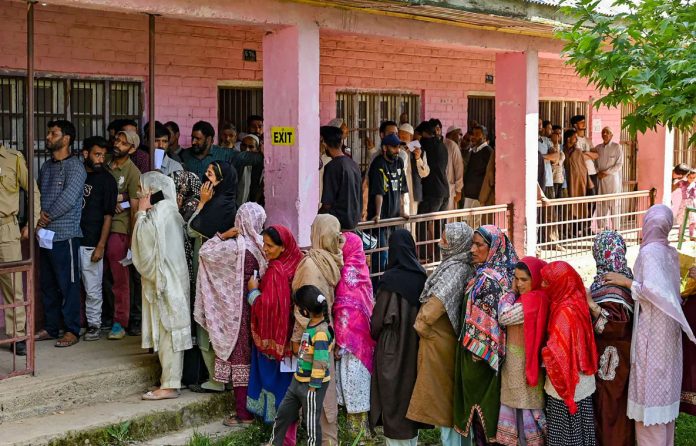Ruveda Salam
Electoral participation of the masses forms the essence of democratic governance and electoral participation of fringe elements who hitherto lacked trust in representative democracy is crucial for the enforcement of the rule of law, social inclusion, and economic development. Against this reality, the current J&K Legislative Assembly election marks many firsts in its electoral history.
The first Assembly election to the legislature of the new Union Territory of Jammu and Kashmir is being conducted peacefully with Senior diplomats from 16 countries being invited to closely monitor the democratic process amid record turnout of voters, particularly in South Kashmir’s Jamaat hotbed of Kulgam district. This time the demographic pattern of voters and electoral candidates will not only affect the polling percentage across Assembly Constituencies, but it will also throw many surprises post-election results which shall be a watershed moment in the electoral politics of the region.
The marginalized sections of the Jammu region shall vote for the first time in the Assembly elections. The nearly 1.50 Lakh voters from amongst 23,000 families of West Pakistan Refugees who escaped the brutality of communal violence during Partition in Pakistan’s Sialkot and settled in Jammu, Samba, and Kathua Districts shall exercise their right to vote after decades of denial of their voting rights despite being a social and economic part of the larger society. The West Pakistan Refugee families have decided to make this historic moment eventful by beating drums and distributing sweets. The Valmiki families putting up at Valmiki Colony, Gandhi Nagar were brought from Gurdaspur and Amritsar in 1957 on the assurance of the then regime in J&K that they would be given permanent resident status instead they ended up working as sanitation workers on a contract basis irrespective of their educational qualifications and were deprived of voting and land proprietary rights. The nearly 2,000 voters of the Valmiki Samaj will exercise their voting franchise for the first time after getting domicile status post-abrogation of Article 370.
The leaders of the banned Jamaat-e-Islami have fielded candidates as independents and organized its first major poll rally in South Kashmir’s Kulgam District since 1987. The Jamaat leaders have backed Separatists Poll boycott calls in the past. There is an upheaval in the political circles of the valley after Jamaat decided to field its candidates in certain assembly constituent segments against prominent political leaders who considered these bastions of their political ideology. Their foray in the recently held Elections for the Lok Sabha as Voters and now as independent candidates for the Assembly Elections marks a sea-change in their stance from advocating people to abstain from voting in the past to openly seeking votes for eradicating drug addiction, addressing unemployment and working for peoplés welfare. Kashmir region’s violent conflict of more than three decades has drained its residents financially besides the loss of precious human lives. Widows and orphans of conflict are struggling with post-traumatic stress disorders and its youth have been pushed towards drug abuse and anxiety disorders. Such is the voter response in the first phase of the Assembly Elections in South Kashmir Constituencies that elderly voters exercised their franchise for the first time in decades.
This Assembly Election is also the very first being conducted under the aegis of the Constitution of India, thus redefining the relation of its populace with the rest of India woven by democratic values and political justice. The candidates are for the first time contesting after taking an oath or affirmation to bear true allegiance to the Constitution of India and uphold its sovereignty and integrity. A vibrant electoral democracy and nationalism have been India’s distinct identities which have withstood storms of regionalism, communalism, and separatism since 1947. This Assembly election is bereft of such elements of regionalism, communalism, and separatism which have threatened the electoral process in the past and put hurdles in the democratic progression of the region along with the rest of the nation. Democracy in Jammu and Kashmir will be further deepened by electing representatives as the rights to vote and contest elections have been reinvigorated across marginalised and fringe elements of its society which in turn will lead to a responsive and accountable political set-up as enshrined in the Constitution of India.
(The author is Deputy Commissioner Income Tax, Jammu)
Trending Now
E-Paper


